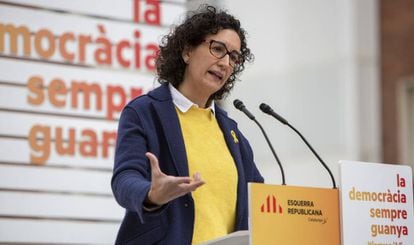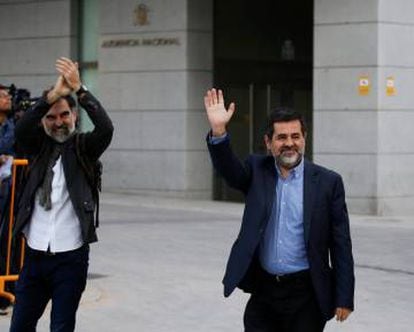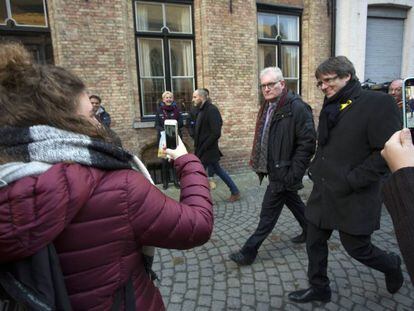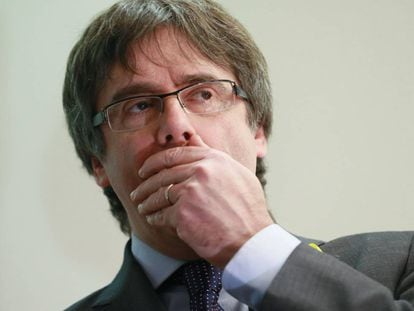Supreme Court ramps up investigation into Catalan independence process
Judicial authorities seeking to establish if political parties and civic organizations worked together

Spain’s judicial system is stepping up its investigation into the recent independence push in Catalonia, with the Supreme Court on Monday ordering the Civil Guard to draw up detailed reports designed to clarify the role of a broad range of individuals, political parties and civic organizations in events leading up to the unilateral declaration of independence voted through in the Catalan parliament on October 27.

Supreme Court Justice Pablo Llarena is already investigating sacked Catalan premier Carles Puigdemont and his former deputy Oriol Junqueras, as well as former ministers of the regional government, members of the Catalan parliament’s speaker’s committee and the heads of two key pro-independence civic organizations, ANC and Òmnium, for their role in an independence movement staunchly opposed by Spain’s central government in Madrid. All face possible charges of rebellion, sedition and misuse of funds.
The Supreme Court is hoping to establish if there was a coordinated independence plan by political parties and civic organizations
But in a new writ made public on Tuesday, Llarena said the scope of the investigation would now be expanded to look at the role played by the Catalan European Democratic Party (PDeCAt) of Puigdemont and the Republican Left of Catalonia (ERC) as well as those of ANC and Òmnium.
Also targeted in the writ are the members of the so-called strategic committee mentioned in the key Enfocat strategy document, considered by Llarena to be the independence route map. This includes ERC secretary general and party candidate for the December 21 regional elections, Marta Rovira, the president and vice president of PDecAT, Artur Mas and Marta Pascal, and the leader and spokesperson for the anti-capitalist CUP party Mireia Boya and Anna Gabriel – although none of these people are cited by name.
The Civil Guard will also look into the activities of the Association of Municipalities for Independence (AMI), an organization made up of representatives of local authorities supporting the independence cause.

The Supreme Court will endeavor to establish whether there was a pre-existing agreement among the PDeCAt and ERC political parties, the ANC and Òmnium civic organizations and the AMI on how to push forward with independence for Catalonia. Llarena will also look at whether these civic organizations paid for actions designed together with political parties.
Judicial sources said the new investigative efforts constituted an attempt to obtain “a panoramic view of the independence process” and would be carried out without prejudice as to the responsibilities of the organizations and individuals involved. Those sources stressed the Supreme Court had ordered the Civil Guard to limit itself to including “objective data” in its reports with a judicial assessment of that information to be made later.
The key concept of the writ is that of a “coordinated plan” with Llarena seeking all participants in that plan.
The Supreme Court justice had previously hinted he would broaden the scope of the investigation into the Catalan independence push and has repeatedly stressed there were indications that pro-independence parties, the Catalan parliamentary speaker’s committee and civic organizations had developed a coordinated strategy to win independence at any price, failing to observe the Constitution and disobeying Constitutional Court rulings blocking moves toward independence.
Judicial sources said the new investigative efforts constituted an attempt to obtain “a panoramic view of the independence process”
In his new ruling, Llarena said he would investigate if any of the political parties, associations or other participants “promoted, sustained or knew, without then altering their plans,” of the social action carried out to achieve or facilitate the independence declaration of October 27.
The justice also asked the Civil Guard for a report on the acts of “aggression, damage and serious resistance or intimidation” during the independence process, and specifically on September 20 and 21 when protesters tried to stop Civil Guard operations in Catalonia aimed at seizing material destined to be used at the October 1 illegal independence referendum.
The Supreme Court will look at whether public funds were used for pro-independence activities including the making of promotional videos, the purchase of ballot boxes and the printing of election materials despite a Constitutional Court ban on such activity.
English version by George Mills.












































